
A lottery is a form of gambling where multiple people buy tickets for a small amount of money in order to have a chance of winning a large sum of money. Lotteries are run by governments to raise money for a variety of purposes, such as education or public health programs.
Despite their popularity and widespread adoption, there are many arguments against the operation of lottery programs. These include the alleged negative effects on poorer individuals, the potential for promoting compulsive gambling, and other problems of public policy.
These arguments have led to the creation of numerous laws and regulations limiting or restricting the operation of lotteries. For example, in the United States, some states have banned the sale of certain types of lottery tickets, while others have imposed additional restrictions.
The evolution of state lotteries is a classic case of public policy being made piecemeal and incrementally. Authority – and pressures on lottery officials – are often fragmented between the legislative and executive branches, and public welfare is taken into consideration only intermittently, if at all.
As lottery revenues have increased, the industry has shifted from a focus on traditional raffles and drawings to more interactive games, and expanded into new fields. This has prompted concerns that these new games exacerbate existing alleged problems with the lottery, such as presenting problem gamblers with far more addictive games.
In addition, the expansion into new forms of gaming – such as keno and video poker – has prompted the formation of an “addiction culture” in which people seek out and consume more and more gambling-related products. While such behaviors are not necessarily harmful, they can be disruptive to an individual’s life or to society as a whole.
This addiction can lead to a number of serious consequences, including financial hardship. In addition, it can also erode social bonds.
Although it is not always possible to avoid the temptation of gambling, it is wise to do so with a plan in place. This plan can be as simple as establishing a spending limit and sticking to it, or it can be more complex, such as creating a savings account to cover emergencies.
Regardless of your plan, however, it is important to remember that there are no guarantees. While some people have won large amounts of money by playing the lottery, there is no guarantee that you will win. Moreover, you can get into serious legal trouble if you cheat the system and lose all your money.
If you do decide to play the lottery, be sure to keep your ticket somewhere safe so that you won’t forget it when it’s time to play. It’s also a good idea to jot down the drawing date and time in your calendar so that you don’t forget it.
Another tip is to choose numbers that are rare, but not astronomically so. These numbers are usually chosen less frequently than other combinations, so they will increase your odds of winning.